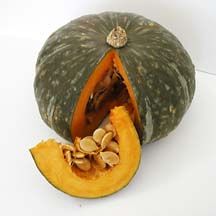
Eleanor Nakama-Mitsunaga
![]()
|
This petite squash imitates a pumpkin on the inside, with its orange flesh and broad, flat seeds, but its forest green color sets it apart.
The basics: Kabocha is a hybrid of a variety of pumpkin called Delica, also known as Ebisu in Japan. It is small compared with other varieties -- on average 9 to 12 inches in diameter and 2 to 3 pounds. Recent trends in Japan have led to even smaller sizes of about a pound each.
The rind is dull green with white striations, and its shape is round and flat like a doughnut. Inside, its prized flesh ranges in color from light to deep orange.
The taste and texture have been compared to sweet potato, although the sweetness and firmness vary somewhat, depending on where it is grown.
New Zealand kabocha is coveted by consumers, although the pumpkin is also widely cultivated in California and Hawaii. Kabocha is a good source of vitamins A and C and beta-carotene.
Selecting: Choose kabocha that is very firm and heavy for its size. Watch out for soft spots and blemishes on the rind. Some say that a deeper green color amounts to sweeter flesh, but that isn't always the case. Unfortunately, it's also difficult to tell whether the flesh will be watery or stringy until it's cooked.
Storing: Whole, uncooked kabocha should be stored in a cool, dry area on the counter, where it should last for several weeks to a month. Once it's cut or cooked, however, it must be refrigerated.
Use: The rind is very difficult to cut and requires a sharp, heavy knife and some muscle. It can be removed but is edible when cooked.
Remove the seeds and stringy membrane, then cut into cubes, slices or quarters.
Kabocha is very versatile and can be baked, steamed, braised or deep-fried. The Japanese like to simmer kabocha in a soy-based sauce until the flesh is creamy soft, or deep-fry it tempura-style in thin slices. A puréed kabocha soup is also quite delicious.
Where to buy: Kabocha is available year-round, although the season peaks in late summer and early fall. You can find kabocha in almost any supermarket, Asian market or farmers' market at $1 to $2 a pound.
Eleanor Nakama-Mitsunaga is
a free-lance food writer. Contact her
online through features@starbulletin.com


